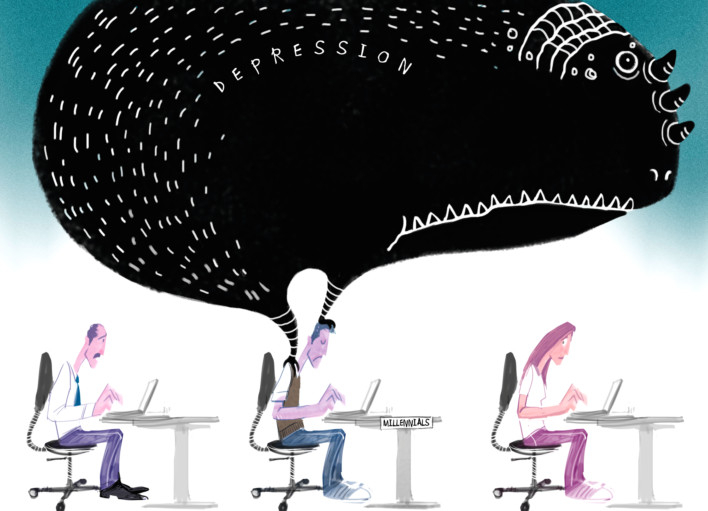
Agitated
We are not able to strike a work-life balance
I agree with the statements that we are the most depressed generation in the workplace. I personally think that it is due to the fact that we are living in a fast-paced society. Everything is constantly moving at a higher rate, so the expectation has increased from us as well. There is also competition among millennials on trying to prove who is the best. I believe this competition can be healthy, but people need to realise that not every individual holds the same values and skills as the other person. Also, if the goals and expectations set by an employer, for example, are unrealistic, not being able to meet these expectations drives the individual to become depressed and in a state of constant agitation. I think society’s attitude needs to change a little.
I personally think that no matter which generation you belong in, some things don’t change such as work ethics and values. We need to realise that hard work pays off. There is no easy route to success. I think my generation is impatient and irresponsible; they are lazy and unable to handle work-life balance because of the external pressures such as social media, where everything is constantly judged. People need to realise that when you are stepping into adulthood you need to leave behind the silly old self and take responsibility for your actions. It doesn’t matter what your age is or how young you are. When you are part of the workforce you are an employee who is expected to bring profit and productivity to the firm, that’s all.
From Ms Sumera Malik
Freelance research executive living in Sharjah
Opportunity
Companies have a lot to gain if they focus on employee wellness
I would rather not generalise and put all millennials in one category. There are some people who would handle a lot of pressure, go the extra mile and take initiative. What I do see is that the majority of millennials think that opening your own business and venturing on your own is easy. They all want to be Mark Zuckerberg [Facebook founder], or Sheryl Sandberg [Facebook COO] or Sara Blakely [American billionaire and founder of Spanx]. They think running a business is easy so they jump very quickly towards such hard decisions, making them based on emotions.
The problem with companies is that they don’t empower millennials the way they should. If you keep them empowered and busy, giving them challenging work, you might be able to retain them a lot more.
Yes, millennials have a different set of expectations but so did Generation X and Generation Y and Baby Boomers. What sets this situation apart is the current environment. A lot of studies indicate that a very large number of workforce will be working from home in five to 10 years. So work mobility and entrepreneurship is playing a big role in changing their mindset. I feel like they are less career-oriented and have a more holistic approach. For them, spending three to five years in a job is too long.
All these factors could be good or bad. There is a lot to gain if companies get this right. First of all, most of your clients are millennials and the purchasing power is with them, so you should have them as part of your workforce.
They also offer a fresh new perspective on things, especially when you talk about innovation. It challenges companies to think more innovatively.
I run a lot of corporate wellness programmes for our clients and I can tell you from data from my clients that ignoring mental health issues is prevalent. Mental health problems are worse than physical problems, yet you can easily get leaves for physical health issues. Even the physical problems can often be because of the burnout caused from depression and work challenges. Companies are not considering this threat seriously and if you look at the price they pay because of the lack of focus on corporate wellness, it is very high. You can see it in the insurance costs, productivity rates and employee retention. All of that is because they are not paying attention to employee wellness. When clients do implement corporate wellness programmes, they have been able to see the benefits in less than a year – in the number of sick days taken, overall productivity and less attrition. You also get new ideas and initiatives, especially when it comes to innovation.
Just like companies are innovating with their products and services, they have to innovate with their human capital procedure and culture. This is a silent threat that they shouldn’t take lightly.
From Mr Camil El Khoury
Senior partner at a Dubai-based human capital consultancy
Difference
We have greater freedom to strike the work-life balance
Criticism arises because of societal norms. Millennials these days have an upper hand in terms of choosing their career path, following their passion, treading on less travelled paths.
So, the criticism arises if a millennial is found to be too loud, that is someone who has a voice, shares his or her opinions and chooses to follow their dreams.
For some, a job is merely a stepping stone to where they eventually want to be but then they tend to be looked upon as a ‘lazy’ person.
I firmly believe that with the umpteen opportunities available for a person in today’s job scene, having a work-life balance forms a core element for millennials. And today’s workplaces have recognised this.
Coming from the hotel industry, when you see international chains with an eight-day off system (once upon a time, even a single off a week was a task), it is a huge change and a positive one at that. And I’m all for a pleasant work-life balance, everything isn’t about the money all the time. It is necessary no doubt, but I believe the experiences you create along the way matter more.
I feel like since we’re now more exposed to how every other person is living their lives, because of social media, there is a certain pressure on everyone to shine and live it large. This can cause a feeling of self-doubt, and anxiety, which builds to mild depression, no doubt.
Couple that with “travel adventures”, “relationship goals”, “stories on Instagram and Snapchat”, we are all guilty of following the trend.
What is important is that we understand how we want to live our life. It is important to understand how your circumstances might be different from another. And most importantly, how the grass isn’t necessarily greener on the other side.
From Ms Michelle Peris
Pastry chef working in New Delhi, India
Isolation
Modernisation has directly increased the rate of depression in society
According to research, rates of depression more than doubled from 1990 to 2000 (in America - 3.33 per cent to 7.06 per cent) and modernisation is associated with higher rates of depression. Millennials grow up in these modern societies where their social environment has more competition, comparison, inequality, social isolation, less social support, more work demands, more stress and greater emphasis on extrinsic goals (money, status, appearance) as opposed to intrinsic goals (social relationships, community). They also tend to have poorer physical well-being, with more physical inactivity. Physical health and exercise determines emotional well-being. Another reason could be change in sleep patterns (8 hours in 1960, as opposed to 6 hours 40 minutes in 2009) and more insomnia rates. Sunlight exposure has also been reduced as more jobs moved indoors and people have longer work hours and less sunlight exposure due to cancer links. This leads to lower vitamin D levels.
Millennials grew up more sheltered than other generations because parents are more protective and their children lack character-building experiences. They are viewed as self-absorbed and with a strong sense of entitlement. In reality they are highly educated and ambitious, but they’re more focused on digital media, competition, technology, achievement and “what’s next”.
For the past two decades, problems related with mental health such as stress and depression have been increasing, not only at the workplace but also in society in general. According to the World Health Organization, depression is the leading cause of disability worldwide and ranks among the top three workplace problems for employee.
Employers are definitely more aware of depression and the stigma surrounding depression is not what it was a generation ago, however there is still a long journey ahead in terms of the support provided by companies. Depressed employees hesitate to reveal their condition to bosses and co-workers for fear of being stigmatised, being seen as weak, or even held back professionally. When an employee is depressed, it can affect not only that employee’s productivity and happiness, but also expand to the entire mood of his or her co-workers and their productivity as well.
Employers are increasingly aware that promoting employee mental health is good for business. A happy employee is more productive, so it makes sense for employers to help people in need of services to find those services. Studies have shown that companies and organisations that are more accepting and supportive with mental health practices have happier employees with better productivity.
From Dr Joao Lourenco
Clinical psychologist working in Dubai
— Compiled by Huda Tabrez, Community Web Editor
Gulf News asked: Does your office offer days off for mental health issues?
Yes 22%
No 56%
I don’t know 22%













